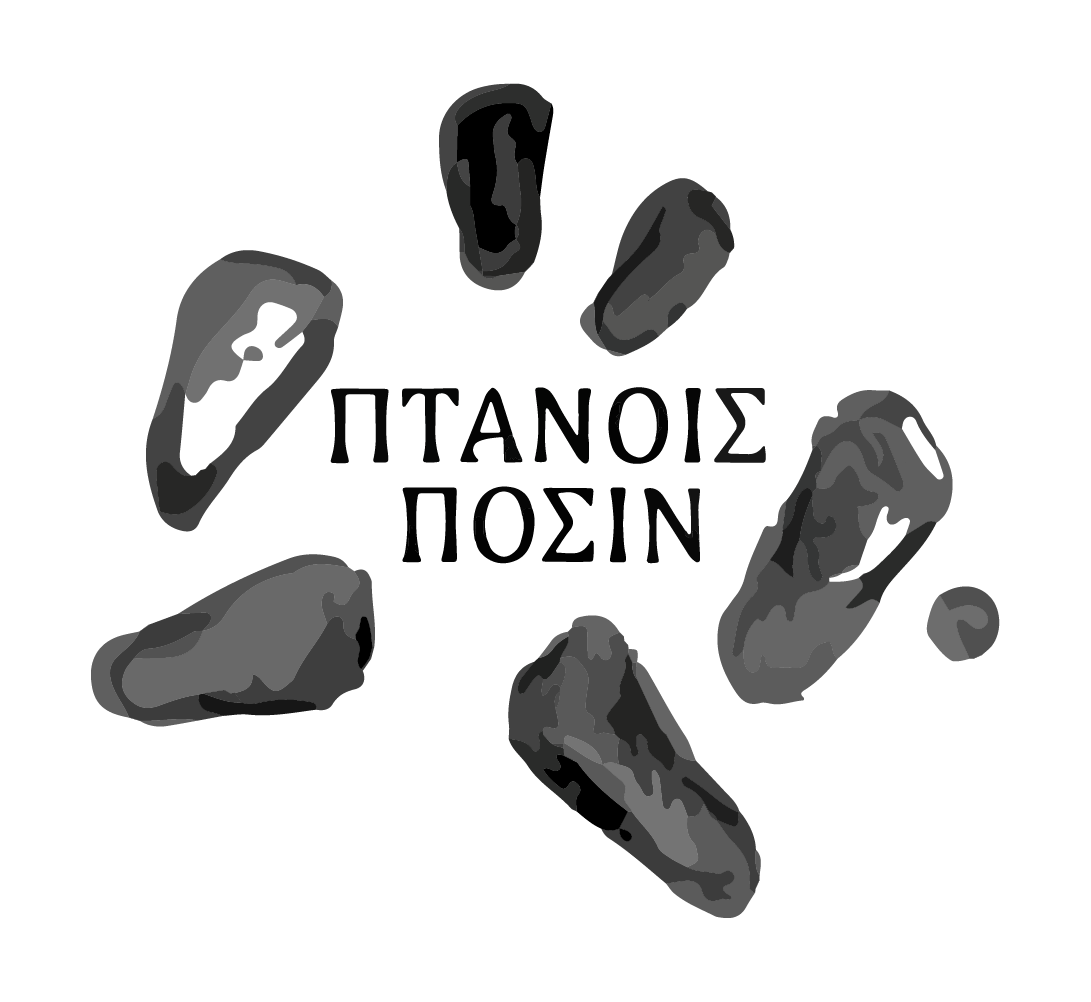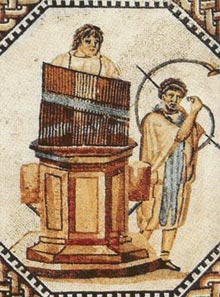Syll3 737
Antipatros from Eleutherna, the son of Breukos: ὕδραυλος
Date:
86 BC
Edition:
[ἄρχοντο]ς̣ Κλεάνδρου τοῦ Τίμωνος, βουλευόντων Πολίτα τοῦ Ἀσάν-
[δρου, Εὐκ]λ̣είδα τοῦ Ἡρακλείδα, Δίωνος τοῦ Καλλία, Θεοξένου τοῦ Πολύωνος,
[ἔδοξε τᾶι] π̣όλει τῶν Δελφῶν ἐν ἀγο̣ρ̣ᾶι τελείωι· ἐπεὶ Ἀντίπατρος Βρεύκου
[Ἐλευθερν]α̣ῖ̣ος, ὕδραυλος, ἀποστειλάσας ποτ’ αὐτὸν τᾶς πόλιος πρεσβεί-
5 [αν παραγ]ενηθεὶς ἐν Δελφοὺς καὶ παρακληθεὶς ὑπὸ τῶν ἀρχόντων καὶ τᾶς
[πόλιος] ἀγωνίξατο ἁμέρας δύο καὶ εὐδοκίμησε μεγαλομερῶς καὶ ἀξίως̣
[τ]οῦ τε θεοῦ καὶ τᾶς πόλιος τῶν Ἐλευθερναίων καὶ τᾶς ἁμετέρας πόλιος̣,
[ἐ]φ’ οἷς καὶ ἐστεφανώθη ἐν τῶι ἀγῶν 〚 rasura ca. 29 〛
〚 rasura ca. 14 〛 εἰκόνι χαλκέαι καὶ τοῖς ἄλλοις τιμίοις πάντοις, ἃς̣ καὶ
10 συνετέλεσ̣ε ὑπὲρ αὐτοσαυτὸν τῶι θεῶι, #⁵⁶ ἐπὶ οὖν τούτοις, ἀγαθ̣ᾶ̣ι̣ τύχ̣α̣ι̣, δ̣εδ̣ό-
χθαι· ἐπαινέσαι Ἀντίπατρον Βρεύκου Ἐλευθερναῖον ὕδραυλον ἐπί τε τ̣ᾶι ποτὶ τὸν
θεὸν εὐσεβείαι καὶ ὁσιότατι καὶ ἐπ̣ὶ τᾶι προαιρέσει, ἇι ἔχων π̣ε̣ρ̣ὶ̣ τ̣ὰ̣ν̣ τέχναν δ̣ιατε-
λεῖ, καὶ τᾶι ποτὶ τὰν πόλ̣ιν ἁμῶν εὐνοίαι. ἐπαινέσαι δ̣ὲ καὶ τὸν ἀ-
δελφὸν αὐτοῦ Κρύτωνα̣ Βρεύκου Ἐλευθερναῖον, καὶ δεδόσ̣θαι αὐτοῖς καὶ
15 ἐκγόνοις π̣αρὰ τᾶς π̣όλιος προξενίαν, προμαντεία̣ν̣, προδικία̣ν̣, ἀσ̣υ-
λίαν, ἀτέλ̣ειαν πά̣ν̣τ̣ων, προεδρίαν ἐμ πᾶσι τοῖς ἀγών̣οις̣ ο̣ἷ̣ς̣ ἁ̣ πό-
λις τίθητι, κ̣α̣ὶ̣ γᾶς κ̣α̣ὶ̣ ο̣ἰ̣κ̣ί̣ας ἔγκτησιν καὶ τᾶλλα τίμι̣α̣ π̣ά̣ν̣τα ὅσ̣α̣
καὶ τοῖς ἄλλοι̣ς πρ[ο]ξ̣έν̣οις κ̣αὶ εὐεργέταις τᾶς πόλιο̣ς̣ ὑπάρχε̣ι̣.
ἀποστεῖλαι δὲ αὐτο̣ῖ̣ς̣ τοὺς ἄρχοντας καὶ ξ̣ένια τὰ μέγιστα·
20 καλέσ̣αι δ̣ὲ̣ αὐτοὺς κα̣ὶ τοὺς μετ’ αὐτῶν ἐν τὸ πρυτ̣α̣ν̣εῖον̣ ἐπ̣ὶ̣
τὰν κ̣οινὰ̣ν̣ τᾶς πόλι̣ος ἑστίαν. ἀναγράψαι δ̣ὲ τὸ ψάφισ̣μ̣α̣ τ̣ο̣ὺ̣ς̣ ἄ̣ρχον̣-
τας ἐν τῶι ἱερῶ̣ι̣ τοῦ Ἀπόλλωνος ἐν τῶι ἐπιφανεστ̣ά̣τ̣ω̣ι̣ τόπ̣ω̣ι̣,
καὶ διαπέμψαι ποτὶ τὰν πόλιν τῶν Ἐλευθερναίων, ὅπω̣ς̣ εἰδ̣ῶσ̣ι̣.
Translations (en):
“Under the archonship of Kleandros, the son of Timon, Politas, the son of Asandros, Eukleidas, the son of Herakleidas, Dion, the son of Kallias, Theoxenos, the son of Polyon, were bouletai. It was resolved by the city of Delphi, in full assembly: since Antipatros from Eleutherna, the son of Breukos, ὕδραυλος, after the city sent an embassy to him, dwelt in Delphi and, being requested by the archons and by the city, showed off and obtained good fame in a way worthy of the god and of the city of Eleutherna and our city, and for this reasons he was crowned in the ἀγών… with a bronze statue and all other honors, (…) which he payed on his own behalf to the god; therefore, for this reasons, to good fortune, it was resolved (by the city of Delphi) to praise Antipatros of Eleutherna, the son of Breukos, ὕδραυλος, for his devotion to the god, for his pietas and good disposition that he keeps showing towards his art and his benevolence towards our city. Shall his brother Kryton of Eleutherna, son of Breukos, be praised as well, and shall they and their descendants be granted, by the city, proxeny, priority in access to the oracle and legal judgements, immunity for possessions, exemption from all taxes, privileged seating at the festivals that the city organizes and the right to possess lands and home and may they have all further privileges that belong to other proxenoi and benefactors of the city. The archons shall send gifts, the richest ones; they shall invite them to the Prytaneion and to the common fireplace. The archons shall have this decree inscribed in the sanctuary of Apollo, in the most prominent place, and they shall send it to the city of Eleutherna, so that it shall be seen”.
Translations (it):
“Sotto l’arcontato di Kleandros figlio di Timon, essendo buleuti Politas figlio di Asandros, Eukleidas figlio di Herakleidas, Dion figlio di Kallias, Theoxenos figlio di Polyon. Sembrò bene alla città di Delfi, in assemblea perfetta: poiché Antipatros di Eleutherna figlio di Breukos, ὕδραυλος, avendo la città inviato un’ambasceria presso di lui, essendosi trovato a Delfi ed essendo stato richiesto dagli arconti e dalla città, diede prova di sè per due giorni e ottenne buona fama splendidamente e in modo degno del dio e della città di Eleutherna e della nostra città, e per questi motivi fu anche incoronato nell’agone … con una statua di bronzo e con tutti gli altri onori, … le quali (dracme?) pagò anche per se stesso al dio, per queste cose dunque, alla buona fortuna, è sembrato bene di lodare Antipatros di Eleutherna figlio di Breukos, ὕδραυλος, per la devozione verso il dio, per la pietas e per la buona disposizione che continua ad dimostrare riguardo all’arte, e per la benevolenza nei riguardi della nostra città. Si lodi anche suo fratello Kryton di Eleutherna figlio di Breukos e si concedano a loro e ai discendenti, da parte della città, la prossenia, il diritto di precedenza nella consultazione dell’oracolo e in giudizio, l’immunità per i propri averi, l’esenzione da tutte le tasse, la proedria in tutti gli agoni che la città bandisce e il diritto di possesso di terra e casa e appartengano a loro tutti gli altri onori quanti sono propri degli altri prosseni ed evergeti della città. Gli arconti mandino a loro anche dei doni, i più grandi; invitino loro e quelli con loro al Pritaneo presso il focolare comune della città. Gli arconti facciano incidere il decreto nel santuario di Apollo, nel luogo più in vista, e lo mandino alla città di Eleutherna, affinchè veda.”
Commentary (en):
The case of this musician from Eleutherna, dwelling in Delphi on city’s request, is noteworthy and representative in the reconstruction of the poeti vaganti phenomenon: Antipatros was skilled at playing on the ὕδραυλις, the first keyboard instrument and forerunner of our pipe organ, designed and realized by the engineer Ctesibius from Alexandria. It is possible that, given Antipatros’ fame, the city of Delphi invited him and his team to offer to the audience some demonstrations on an instrument of recent invention.
Commentary (it):
Il caso di questo strumentista da Eleutherna, che giunse a Delfi su espressa richiesta della città è estremamente interessante. Antipatros era un esperto suonatore di ὕδραυλις, primo strumento a tastiera e antesignano del moderno organo a canne, che fu progettato e realizzato dall’ingegnere alessandrino Ctesibio. È credibile che Delfi abbia voluto invitare lo specialista di uno strumento d’invenzione recente per offrirne delle dimostrazioni al colto pubblico cittadino.
Bibliography:
For discussion of this document, see Cinalli 2014a.



